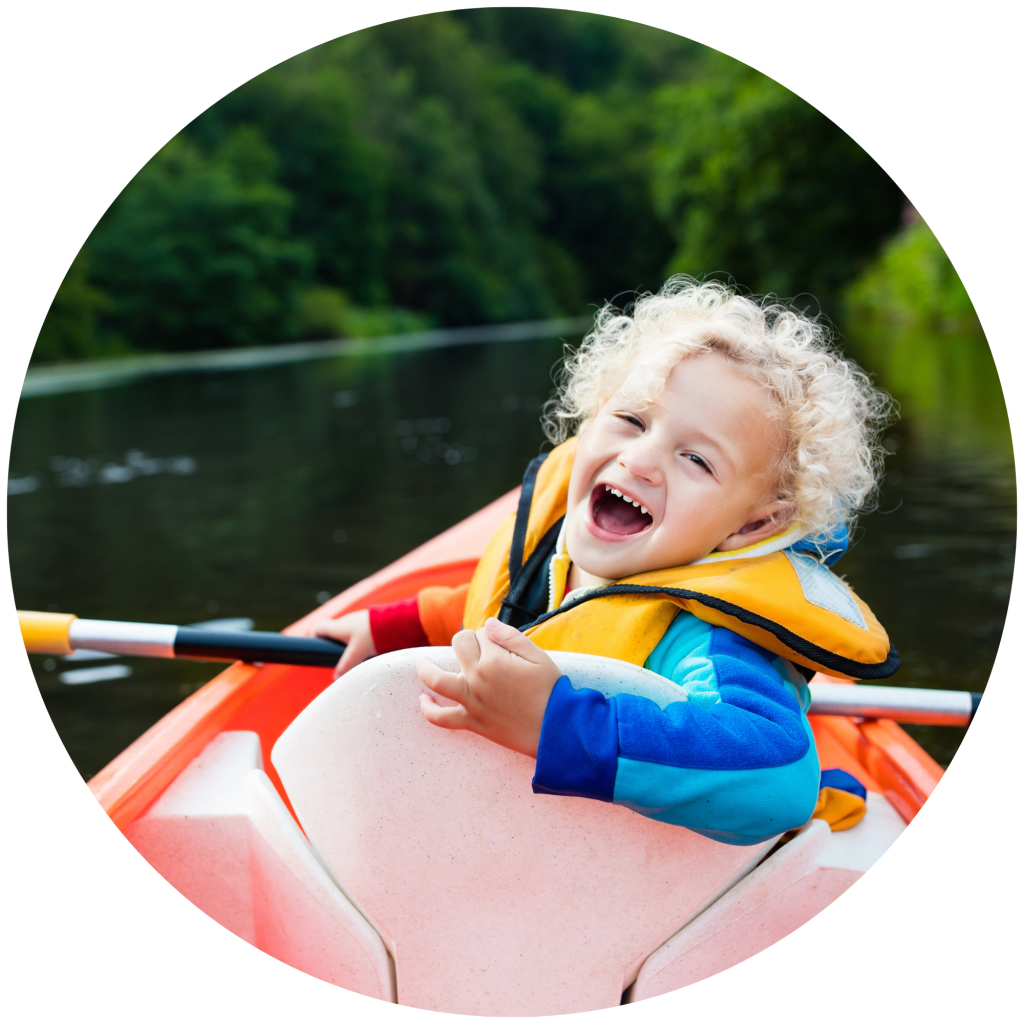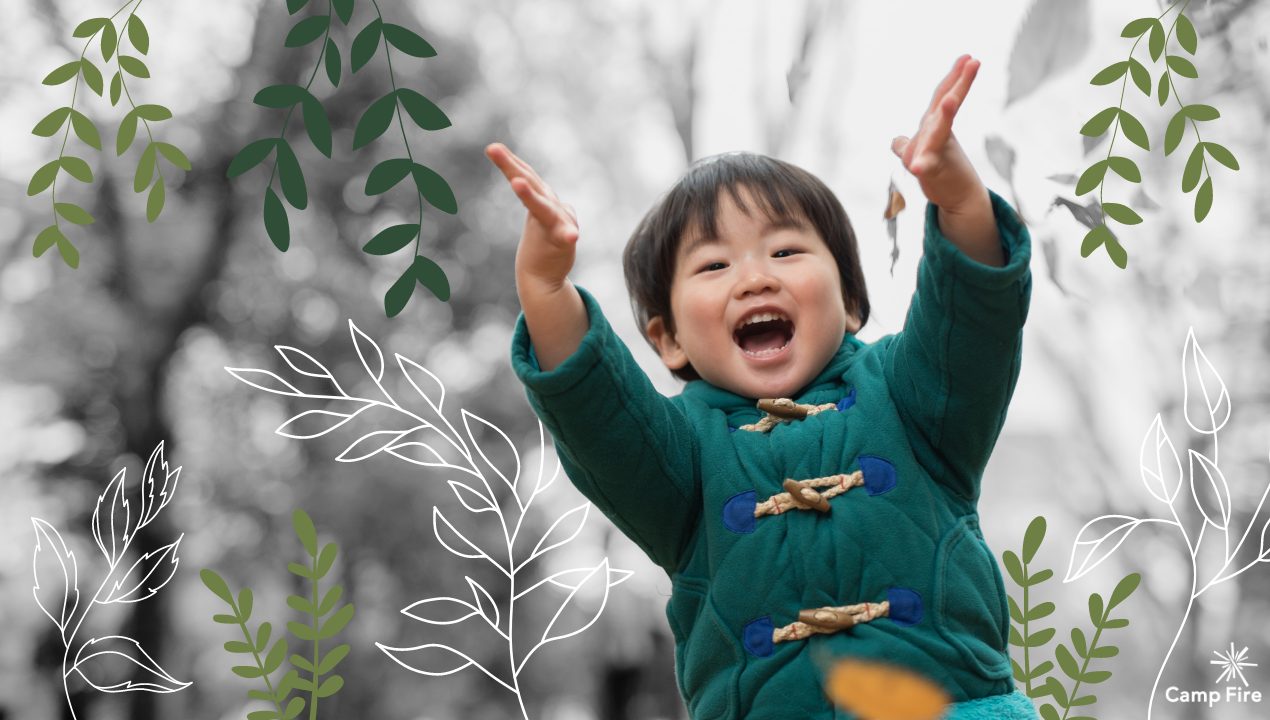
Guest post by Amelia Rhodeland, MPA, Content Production Manager, Children & Nature Network
For Absolutely Incredible Kid Day®, spend some time outdoors with the young people in your life. I can’t imagine a better way to show them that you care about them.
Research shows that families who spend time in nature develop strong bonds, better communication and incredible memories. At the Children & Nature Network, we support healthy, active families outdoors in a variety of ways, from large scale national partnerships, to working locally with community partners to reduce barriers to nature. These are values that we know Camp Fire believes in, too.
Like Camp Fire says, “Growing up is hard,” and it seems to have gotten even trickier to navigate in recent years, with screen time at an all-time high, youth experiencing a national mental health crisis and climate change anxiety on the rise. Author and Children & Nature Network co-founder Richard Louv coined the term “nature-deficit disorder” to describe the suite of symptoms that can stem from children’s lack of connection with nature today.
But the same thing that young people are lacking can also be a comprehensive solution, helping young people to be healthier, happier and more capable — nature connection. Research tells us that regular time outdoors is essential for children’s development. If you’re looking to encourage and empower young people, time in nature is an excellent way to do so.
Sold on the benefits of nature connection but looking for easy ways to implement this strategy in everyday life? There are so many ways that caregivers can help their children and teens connect with nature. I’ve listed a few below.
Spend some time on self-care in nature.
According to scientific studies, mindfully connecting with nature can produce a variety of health benefits, promoting physical, mental and social well-being. Integrate self-care into the daily routine for you and your little ones. You can do so by tuning into your five senses, regularly taking mini breaks for nature connection throughout the day, and practicing “earthing” — connecting directly to nature by walking or standing on grass, sand or dirt while barefoot. Check out this infographic for more on the ways that families can practice self-care in nature.

Get inspired by Nature Activity Cards.
You’ve managed to get your kiddos dressed, fed and to the park. Now what? If you just need a little bit of guidance once you get outside, fear not. These Nature Activity Cards will help inspire all types of creative nature play! Cards are separated into two suggested age groups, 2-6 and 7-11 years old, with six themed packs for each age group. Choose from themes like reptiles, nature crafts, clouds, nocturnal urban animals, camping and winter-appropriate activities. Each themed pack has an assortment of age-appropriate activities, incorporating elements of play, environmental stewardship, storytelling and more.

Plant a garden.
Scientists have found that gardening is good for the health and development of children and youth of all ages — not to mention the positive effects it can have on the environment. You can take baby steps by starting with just a few seeds in small pots indoors. Children love to track seedlings as they grow and change. You’ll find more inspiration in these true stories of schools promoting science equity, environmental literacy and healthy eating through their gardens. In Perú, an innovative approach called Tierra de Niños (TiNis), or Children’s Lands, gives children of all ages the opportunity to design, create and manage gardens of their own as a way of connecting with nature and empowering them to be agents of change. Read these resources for additional guidance on creating your own home garden with your favorite young people: “Little gardeners: Home-grown connections to the natural world” by Julie Cerny, and “20 ways to create a naturally restorative home and garden” by Richard Louv.
Take on the Vitamin N Challenge.
It’s easy to get sucked into a busy schedule of appointments, drop-offs and play dates, and find yourself skipping the nature connection time that’s essential for health and well-being. That’s where the Vitamin N Challenge can help, encouraging you and your family to commit to getting a regular dose of the all-important Vitamin N — Nature! Inspired by our co-founder Richard Louv’s book, “Vitamin N: The Essential Guide to a Nature-Rich Life,” the Vitamin N Challenge can take any shape or size that works for you. It’s all about setting and committing to a goal that will help you and your family get more Vitamin N. We run a big Vitamin N Challenge every summer, so mark your calendars! But any time is a great time to commit to getting more time outdoors, so check out the Vitamin N page for inspiration and resources to help you stay on track with your Vitamin N Challenge.
Find a nature hobby.
Gamifying the outdoors like a video game. Nature journaling. Hiking. Reading picture book pages while on a simple trail. Camping. Connecting with other families and caregivers through family hiking groups. Wildlife photography. Horseback riding. The Nordic custom of friluftsliv.
These are just a few of the outdoor activities that families and caregivers can use to connect with nature — and each other. The options are endless. If you’re interested in exploring a new outdoor hobby, there are resources that can help you borrow needed equipment before you commit. Public libraries are increasingly building out gear libraries so that residents can check out outdoor gear for free. Many are also integrating gardens and other natural elements into their designs. Local clubs organized by groups like Hike it Baby may also lend out baby backpacks and slings to help caregivers find the right baby-wearing option for them and their child.

Each of these activities empowers young people and helps them feel confident. And, while you’re enjoying quality time with your favorite young people, take a moment to let them know how much they are appreciated. The outdoors is a great place to do so.
Resources to help families connect with nature
- Resources for families
- 4 ways to practice self-care in nature infographic
- Nature Activity Cards
- Garden advice: “”Little gardeners: Home-grown connections to the natural world” by Julie Cerny, and “20 ways to create a naturally restorative home and garden” by Richard Louv
- Vitamin N Challenge resources and inspiration
- Real-life stories of nature connection in Finding Nature News
- Scientific research that makes the case for connecting children to nature in our Research Library





